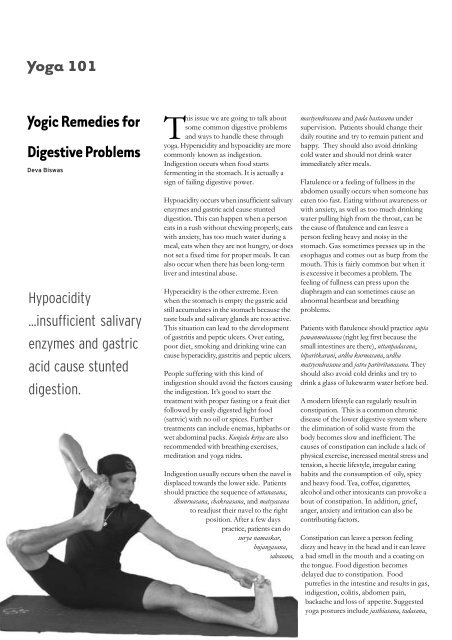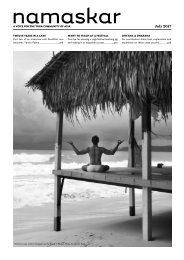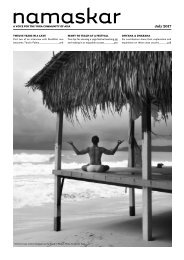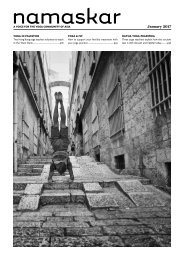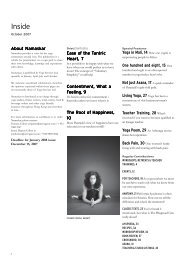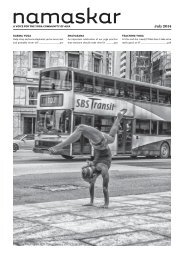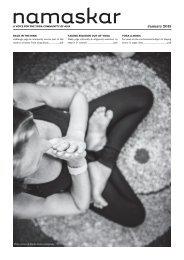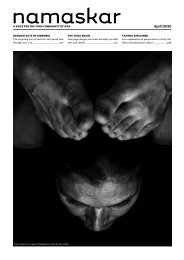You also want an ePaper? Increase the reach of your titles
YUMPU automatically turns print PDFs into web optimized ePapers that Google loves.
Yoga 101<br />
Yogic Remedies for<br />
Digestive Problems<br />
Deva Biswas<br />
Hypoacidity<br />
...insufficient salivary<br />
enzymes and gastric<br />
acid cause stunted<br />
digestion.<br />
16<br />
This issue we are going to talk about<br />
some common digestive problems<br />
and ways to handle these through<br />
yoga. Hyperacidity and hypoacidity are more<br />
commonly known as indigestion.<br />
Indigestion occurs when food starts<br />
fermenting in the stomach. It is actually a<br />
sign of failing digestive power.<br />
Hypoacidity occurs when insufficient salivary<br />
enzymes and gastric acid cause stunted<br />
digestion. This can happen when a person<br />
eats in a rush without chewing properly, eats<br />
with anxiety, has too much water during a<br />
meal, eats when they are not hungry, or does<br />
not set a fixed time for proper meals. It can<br />
also occur when there has been long-term<br />
liver and intestinal abuse.<br />
Hyperacidity is the other extreme. Even<br />
when the stomach is empty the gastric acid<br />
still accumulates in the stomach because the<br />
taste buds and salivary glands are too active.<br />
This situation can lead to the development<br />
of gastritis and peptic ulcers. Over eating,<br />
poor diet, smoking and drinking wine can<br />
cause hyperacidity, gastritis and peptic ulcers.<br />
People suffering with this kind of<br />
indigestion should avoid the factors causing<br />
the indigestion. It’s good to start the<br />
treatment with proper fasting or a fruit diet<br />
followed by easily digested light food<br />
(sattvic) with no oil or spices. Further<br />
treatments can include enemas, hipbaths or<br />
wet abdominal packs. Kunjala kriya are also<br />
recommended with breathing exercises,<br />
meditation and yoga nidra.<br />
Indigestion usually occurs when the navel is<br />
displaced towards the lower side. Patients<br />
should practice the sequence of uttanasana,<br />
dhunruasana, chakraasana, and matsyasana<br />
to readjust their navel to the right<br />
position. After a few days<br />
practice, patients can do<br />
surya namaskar,<br />
bujangasana,<br />
salvasana,<br />
mastyendrasana and pada hastasana under<br />
supervision. Patients should change their<br />
daily routine and try to remain patient and<br />
happy. They should also avoid drinking<br />
cold water and should not drink water<br />
immediately after meals.<br />
Flatulence or a feeling of fullness in the<br />
abdomen usually occurs when someone has<br />
eaten too fast. Eating without awareness or<br />
with anxiety, as well as too much drinking<br />
water pulling high from the throat, can be<br />
the cause of flatulence and can leave a<br />
person feeling heavy and noisy in the<br />
stomach. Gas sometimes presses up in the<br />
esophagus and comes out as burp from the<br />
mouth. This is fairly common but when it<br />
is excessive it becomes a problem. The<br />
feeling of fullness can press upon the<br />
diaphragm and can sometimes cause an<br />
abnormal heartbeat and breathing<br />
problems.<br />
Patients with flatulence should practice supta<br />
pawanmutasana (right leg first because the<br />
small intestines are there), uttanpadasana,<br />
biparitkarani, ardha kurmasana, ardha<br />
matsyendrasana and jatra parivritanasana. They<br />
should also avoid cold drinks and try to<br />
drink a glass of lukewarm water before bed.<br />
A modern lifestyle can regularly result in<br />
constipation. This is a common chronic<br />
disease of the lower digestive system where<br />
the elimination of solid waste from the<br />
body becomes slow and inefficient. The<br />
causes of constipation can include a lack of<br />
physical exercise, increased mental stress and<br />
tension, a hectic lifestyle, irregular eating<br />
habits and the consumption of oily, spicy<br />
and heavy food. Tea, coffee, cigarettes,<br />
alcohol and other intoxicants can provoke a<br />
bout of constipation. In addition, grief,<br />
anger, anxiety and irritation can also be<br />
contributing factors.<br />
Constipation can leave a person feeling<br />
dizzy and heavy in the head and it can leave<br />
a bad smell in the mouth and a coating on<br />
the tongue. Food digestion becomes<br />
delayed due to constipation. Food<br />
putrefies in the intestine and results in gas,<br />
indigestion, colitis, abdomen pain,<br />
backache and loss of appetite. Suggested<br />
yoga postures include jasthiasana, tadasana,


